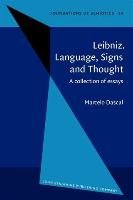Why was Leibniz so deeply interested in signs and language? What role does this interest play in his philosophical system? In the essays here collected, Marcello Dascal attempts to tackle these questions from different angles. They bring to light aspects of Leibniz's work on these and related issues which have been so far neglected. As a rule they take as their starting point Leibniz's early writings (some unpublished, some only available in Latin) on characters and cognition, on definition, on truth, on memory, on grammar, on the specific problems of religious discourse, and so on. An effort has been made to relate the views expressed in these writings both to Leibniz' more mature views, and to the conceptions prevailing in his time, as well as in preceding and following periods. The common thread running through all the essays is to what extent language and signs, in their most varied forms, are related to cognitive processes, according to Leibniz and his contemporaries.

